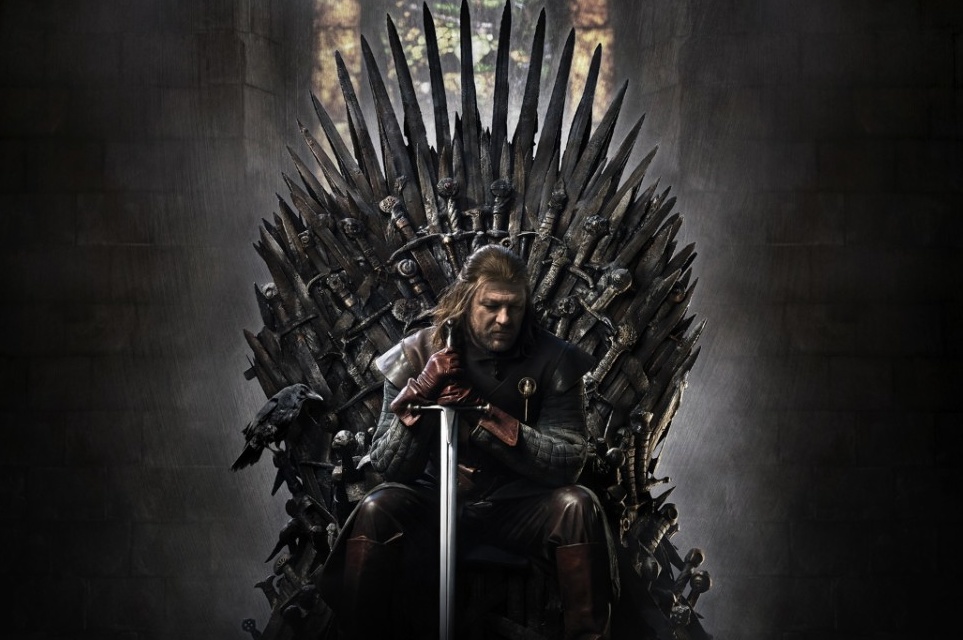Ned Stark sits atop the Iron Throne (Photo: HBO)
Games of Thrones debuts its eighth and final season on Monday. Louise Coopey, a Ph.D. candidate at the University of Birmingham, writing for Birmingham Perspective, looks at the series’ songs about damaging and damaged men:
“I’m trying to get you to run my kingdom while I eat, drink, and whore my way to an early grave.”— King Robert Baratheon to Ned Stark
Robert Baratheon’s assessment of his motive is a moment of honesty amid the worst of masculinity in Game of Thrones. Sitting on the Iron Throne is one long party for his benefit, and his benefit alone.
Baratheon won the throne in battle, proving his masculine credentials by fighting for the honour of a woman and killing Prince Rhaegar Targaryen in hand-to-hand combat. He reinforced those credentials with drinking, more fighting, hunting, jousting, sleeping with many women who were not his wife, and indulging in a little domestic violence.
The first season of Game of Thrones is a story of damaging masculinity, with strict gender roles enforced without exception. Men are leaders, women are wives and mothers. Norms are policed; those who don’t conform are rejected, pushing the cripples, bastards, and broken things to the margins of society. Titles are passed to undeserving sons and violence is an answer to everything.
Ned Stark might emphasize honor, but he meets his demise at the hands of a boy with none.
Masculinity is toxic, with Joffrey the poisonous product. His entitlement is grounded in the divine rights of men and kings but, far from using hereditary powers for good, he pursues evil. Threatening his mother, killing prostitutes with a crossbow, chopping his future father-in-law’s head off and forcing his bride-to-be to look at it — Joffrey is an evil sociopath simply because he can be.
But Joffrey is damaged as well as damaging. He’s neither brave nor chivalrous, relying on others for his victories and then, like a true coward, claiming all the credit like a true coward. He has no power of his own despite being king after Robert’s death. He is reliant on his grandfather, Tywin, the man who sent him to bed without his supper with the reminder, “Any man who must say ‘I am the king’ is no true king.”
Tywin is right. Joffrey is no king. Then again, neither is Tywin. He may be the puppet master of Westeros, but his death is a rejection of all that is wrong with masculinity. His death, while sitting on the toilet, at the hand of his rejected dwarf son Tyrion, is a fitting end to his reign of terror.
The Redemption of Jon Snow?
Compare Joffrey to Jon Snow, the most likely male candidate for the Iron Throne. Snow is also a character of damaged masculinity. Excluded under masculine norms, his identity is grounded in his status as Ned Stark’s bastard son. He is rejected by Ned’s wife, Catelyn, who freely admits she can’t love him. So Snow choose the Night’s Watch, a band of broken men pushed to the margins of society, as an alternative.
Snow does not subscribe to norms. He fights the establishment, embraces the Wildlings, and bends the knee to a woman. As the poster boy for a new form of masculinity, he sits easily beside powerful women rather than pushing them down, a lesson hard-learned when he refused to listen to “sister” Sansa’s advice at the Battle of the Bastards. A product of damaging masculinity, he has become the figure that can definitively reject it, especially with the revelation that he is Rhaegar Targaryen’s legitimate heir.
Of course, there are the queens — Daenerys and Cersei — who already reject the damaging masculinity. But doing so from within the realm of men compounds the rejection and heralds the need for a more equal society.
Can Game of Thrones follow through in its challenge to traditional patriarchal masculinity, instead of reverting to tried-and-tested storylines that restore it? Jon Snow may know nothing ahead of season eight, and when the ice melts, all bets are off.

